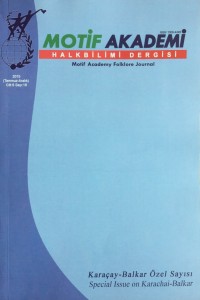Abstract
the article gives a brief review of study of modern Karachai-Balkar language, basic problems of its functioning and the prospects for further improvement and development, outlines the main ways of integration of the Turkic languages of the North Caucasus and the overseas diasporas. This work analyzes the language form the historical linguistic point of view, studies it taking into account the first editions and the fundamental works published recently. Contrary to opinion that existed earlier about the absence of writing among the ancestors of the Karachais and Balkars, the latest achievements of Karachai-Balkar linguistics and turkological studies suggest that they used the inherited ancient Turkic alphabet. Proofs of this view are found on the territory of Karachai and Balkaria - decrypted and qualified runic monuments – inscriptions. Special emphasis is placed on problems of interaction with Diaspora habitat, with compactly living Karachais and Balkars in the CIS countries, Turkey, Syria, the US. Also the article describes the language situation in Kabardino-Balkaria and Karachai-Circassia, where Karachai-Balkarian language is the official state language of these subjects of the Russian Federation. The author predicts the future prospects of preservation and development of modern literary Karachai-Balkar language in the context of globalization. It is noted that in areas of distribution of language of Karachais and Balkars the situation isn't critical and isn't dramatic, but demands the mobilization of internal resources of the studied language and the organization of effective process of systematic real functioning. It is stated that in the distribution of the language of the Karachais and Balkars, the situation is not critical and dramatic, but requires the mobilization of internal resources of the language studied and organization of effective process of systematic real functioning.
Abstract
в статье дается краткий обзор изученности современного карачаево-балкарского языка, изложены основные проблемы его функционирования и определены перспективы дальнейшего совершенствования и развития, намечены магистральные пути интеграции тюркских языков Северного Кавказа и зарубежных диаспор. В работе сделан лингвоисторический анализ исследуемого языка с учетом первых изданий и опубликованных за последние годы фундаментальных работ. Вопреки ранее существовавшему мнению о бесписьменности предков карачаевцев и балкарцев, последние достижения карачаево-балкарского языкознания и тюркологии дают основание полагать, что они пользовались унаследованной древнетюркской письменностью. Подтверждением этому служат найденные на нынешней территории Карачая и Балкарии, дешифрованные и квалифицированные рунические памятники – письмена. Особый акцент делается на проблемы взаимодействия с диаспорным ареалом, - с компактно проживающими карачаевцами и балкарцами в странах СНГ, Турции, Сирии, США; характеризуется языковая ситуация в Кабардино-Балкарии и Карачаево-Черкесии, где карачаево-балкарский язык является официальным государственным языком этих субъектов Российской Федерации. Прогнозируются дальнейшие перспективы сохранения и развития современного литературного карачаево-балкарского языка в условиях глобализации. Констатируется, что в ареалах распространения языка карачаевцев и балкарцев ситуация не критична и не драматична, но требует мобилизации внутренних ресурсов исследуемого языка и организации эффективного процесса планомерного реального функционирования.
Details
| Other ID | JA93PN97AK |
|---|---|
| Journal Section | Articles |
| Authors | |
| Publication Date | December 1, 2015 |
| Submission Date | December 1, 2015 |
| Published in Issue | Year 2015 Volume: 8 Issue: 16 |

